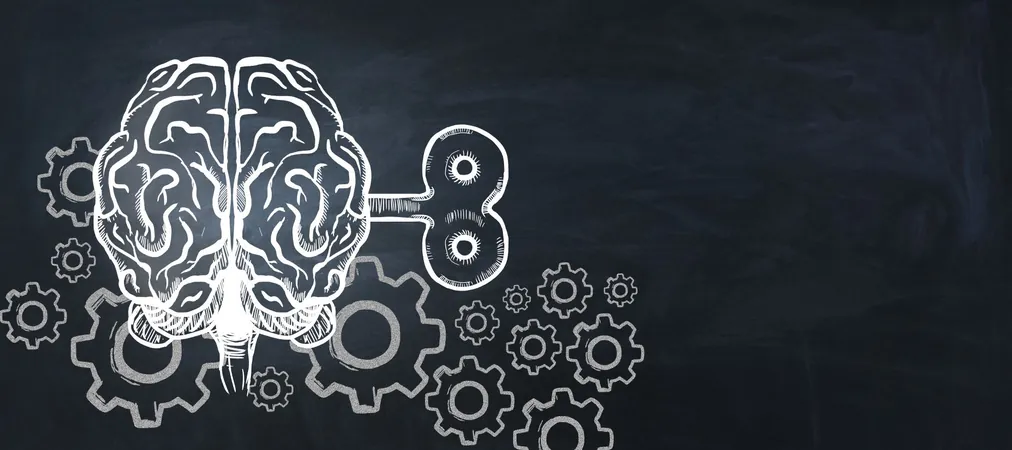
Revolutionary Anti-Aging Technology Could Reverse Brain Aging!
2024-11-06
Author: Mei
A groundbreaking study published in Cell Stem Cell sheds light on a potential game-changer in the fight against accelerated brain aging: a novel anti-aging technology known as cellular reprogramming. Conducted by an international team of scientists, this research suggests that cellular reprogramming could rejuvenate brain cells, fundamentally altering our understanding of aging and its effects on cognitive function.
What is Cellular Reprogramming?
Cellular reprogramming involves reverting cells back to an earlier developmental stage using the so-called Yamanaka factors—four genes initially devised to turn adult cells into stem cells. Remarkably, the transient activation of these genes has been shown to make cells younger without transforming them into stem cells. This discovery opens new horizons not only for aging treatment but also for neurodegenerative conditions like Alzheimer’s disease.
How Cellular Reprogramming Works on the Brain
Historically, cellular reprogramming has demonstrated the ability to extend the lifespan of animal models and rejuvenate various organs. However, the effects on the brain remained largely untested—until now. Researchers conducted experiments on genetically modified mice, introducing cellular reprogramming techniques while the mice were still developing in the womb. The results were astonishing: the mice exhibited enhanced brain development, improved balance, sociability, and reduced compulsive behaviors.
Further experimentation involved administering Yamanaka factors to mice modeling Alzheimer’s disease, which led to decreased biomarkers associated with the illness, including the accumulation of amyloid beta plaques—known culprits in brain aging and cognitive decline.
Boosting Brain Performance
The implications of this study are profound. The cellular reprogrammed mice not only showed improvements in cognitive flexibility and memory but also experienced a notable increase in dendritic spines, the structures on neurons that facilitate communication between brain cells. This enhanced communication means a better-functioning brain overall.
While cognitive performance improved, the study also highlighted a limitation: the cellular reprogramming did not alleviate anxiety or depression symptoms. This indicates that while this technology may mitigate cognitive deficits, emotional responses tied to Alzheimer’s disease require different approaches.
The Future of Anti-Aging Technology
As promising as these findings are, it’s important to note that research on human applications is still in its infancy. The first human trials using cellular reprogramming are anticipated to begin in 2025 for a rare eye disorder. Until then, this revolutionary science remains a tantalizing prospect for combating accelerated brain aging.
Lifestyle Changes You Can Make Now
While we wait for this technology to mature, there are proactive steps individuals can take to stave off accelerated brain aging. Following a balanced diet rich in nutrients, engaging in regular physical exercise, and maintaining a healthy weight are crucial.
Quality sleep is another often-overlooked factor that plays a vital role in cognitive health. Adequate restful sleep can significantly reduce the risk of cognitive decline and Alzheimer's disease.
Additionally, nurturing social connections and engaging in stress-reduction techniques such as yoga or mindfulness can profoundly impact overall brain health. Finally, trying your hand at mentally stimulating activities—like learning a new skill or reading—can help keep your mind sharp.
In conclusion, while cellular reprogramming technology provides an exciting glimpse into the future of anti-aging therapy, maintaining a healthy lifestyle today is paramount in the fight against accelerated brain aging. The race against time continues, but advancements in science bring us hope and a clearer path forward.
Stay informed—your brain health might just depend on it!



 Brasil (PT)
Brasil (PT)
 Canada (EN)
Canada (EN)
 Chile (ES)
Chile (ES)
 España (ES)
España (ES)
 France (FR)
France (FR)
 Hong Kong (EN)
Hong Kong (EN)
 Italia (IT)
Italia (IT)
 日本 (JA)
日本 (JA)
 Magyarország (HU)
Magyarország (HU)
 Norge (NO)
Norge (NO)
 Polska (PL)
Polska (PL)
 Schweiz (DE)
Schweiz (DE)
 Singapore (EN)
Singapore (EN)
 Sverige (SV)
Sverige (SV)
 Suomi (FI)
Suomi (FI)
 Türkiye (TR)
Türkiye (TR)